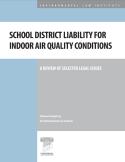
Research Reports
ELI publishes Research Reports available for free download that present the analysis and conclusions of the policy studies ELI undertakes to improve environmental law and policy. These reports contribute to education of the profession and disseminate diverse points of view and opinions to stimulate a robust and creative exchange of ideas. Those publications, which express opinions of the authors and not necessarily those of the Institute, its Board of Directors, or funding organizations, exemplify ELI’s commitment to dialogue with all sectors.
Using Pennsylvania as a case study, ELI examines how sewage infrastructure affects land use planning.
Read More >
Securing the Promise of Nanotechnology: Is U.S. Environmental Law Up To the Job? summarizes the output of a multi-stakeholder dialogue hosted by ELI and the Woodrow Wilson International Center for Scholars, held earlier this year. The Dialogue brought together noted scientists, lawyers, and policymakers to examine how US laws and regulations, as well as additional means of governance such as voluntary programs and industry standards, can be used effectively to address the environmental, health, and safety implications of nanotechnologies.
Read More >
This report discusses selected legal issues in IAQ-related claims brought against public school entities by parents or school staff. The report focuses on claims in three areas of the law: (1) state workers’ compensation systems, (2) common law tort, and (3) federal disability rights/non-discrimination statutes.
Read More >
This report, co-produced with Resources for the Future, introduces for the first time a framework that can be used to plan for the types of activities and associated costs required to implement successfully institutional controls (ICs). Institutional controls are used at contaminated sites that are cleaned up to standards based on the assumption that they will be used in ways that will avoid exposing people to hazardous substances that remain in buried soils or groundwater.
Read More >
This study seeks to analyze seven core areas of state wetland programs, including regulatory programs, water quality standards, monitoring and assessment programs, restoration projects and initiatives, public/private partnerships, education and outreach, and coordination with state and federal agencies. Twelve states are examined in Phase I of the study, which will eventually expand to cover all 50 states.
Read More >